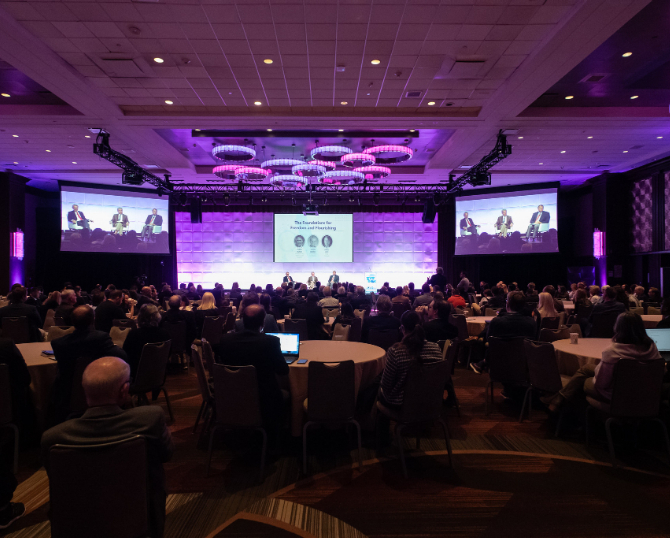
Adam Weinberg | Director of Marketing & Communications
This op-ed originally appeared in The New York Post.
People you’ve probably never heard of are meeting behind closed doors in cities such as New York, Madrid, Johannesburg, Punta del Este and Kuala Lumpur.
Hailing from more than 100 countries, they’re laying the foundations for unprecedented changes around the globe.
But I’m not talking about the United Nations or the World Economic Forum.
Leftist journalists say this “shadowy” network should terrify you.
A Guardian columnist recently claimed that although this movement may appear to be “a wild and improbable conspiracy theory,” its participants “steer policy around the world.”
Why are leftists more alarmed than usual?
Because this little-known international cabal is colluding to secure your constitutional rights; scheming to cut your taxes; and coldly calculating how to battle inflation, cut red tape, unleash entrepreneurship and eradicate poverty.
Those are the designs of the ominous Atlas Network, a worldwide freedom movement including nearly 600 independent free-market think tanks based here in the United States and throughout the Americas, Africa, Asia, Oceania and Europe.
Because I’ve been part of this global conspiracy for about a decade, I can let you in on our “secrets.”
Like so many cloak-and-dagger experiences, my story begins in a windowless office in Omaha, Neb.
I was working at a think tank focused on tax and regulatory reform when I was invited to a training program in Colorado to connect with peers at similar free-market organizations.
As the conspiracy theorists have undoubtedly surmised, it was sponsored by their latest bogeyman: Atlas Network.
There were no secret handshakes or initiation rites, just some PowerPoint slides about marketing for think tanks.
But as I looked around the room, I nonetheless sensed there was something much larger afoot.
It seemed like a lot of thought went into assembling this cosmopolitan gathering of people like me — nerds, I mean — who care a lot about whether the government and wider society respect individual rights.
And indeed, it was all part of a plan: The strategy of changing the world by building a network of independent, nonpartisan freedom-focused groups started with Nobel-laureate economist Friedrich Hayek.
After the horrors of prior decades, including World War II, slave-labor camps, totalitarianism and the Holocaust, Hayek advised advocates of free societies to focus their energy on influencing public opinion.
He recognized that politicians — even good ones — don’t stray far from the policies currently acceptable among voters.
Milton Friedman, himself a longtime friend of Atlas Network, shared that view.
Friedman was known for saying the freedom movement’s goal should be to change public attitudes so that even the wrong leaders would find it politically profitable to do the right thing.
To that end, Atlas Network hosts Liberty Forum conferences on five different continents each year, connecting those we call “idea entrepreneurs.”
These events are like an Anti-Davos. Instead of planning what the world should become from the top down, freedom advocates meet their peers in a trade-show-type environment to swap ideas and refine their own local solutions.
Attendees from Nebraska, Tennessee and California share experiences and workshop problems with counterparts from around the world, from Brazil to Ghana to Indonesia to Italy.
In addition to networking and coaching, Atlas Network fosters friendly rivalries by hosting pitch competitions and award programs that financially support ambitious projects for policy change.
The grantmaking budget underwriting this planetary power play is about $5 million a year — a tiny fraction of what socialist authoritarians pay for their private jets.
At first, it was hard for me to understand why a group of tax wonks from Nebraska would have any business competing alongside international partners, some of whom risk being arrested or killed for speaking up for freedom in their countries.
Yet my colleagues from abroad remind me that although the United States is an imperfect union, we still inspire billions of people.
The principles at our nation’s foundation, which we often take for granted, remain beyond reach for most of humanity.
When we chip away at bad laws that permit government overreach and corruption in Omaha or Washington, DC, the changes may sometimes appear modest.
But in much of the world, enacting similar reforms can protect the rule of law, end abusive and inhumane practices or lift millions of people out of poverty.
No matter how frustrated I get with the current state of affairs, being part of a worldwide freedom movement leaves me with confidence that there’s a better future ahead for humanity.
That’s the conspiracy unveiled — Hayek and Friedman’s vision laid bare for all to see.
When we work together to support individual liberty, limited government and free markets, humanity can enjoy remarkable progress.
Our socialist critics just assumed it was a secret because no one thought to invite them.